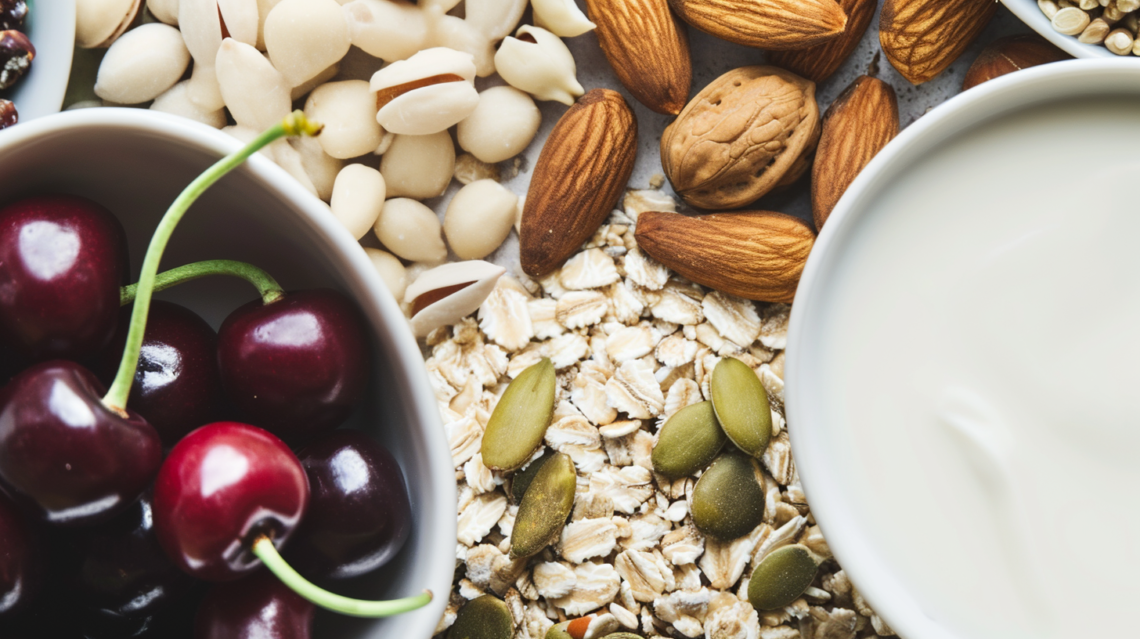Diet
-
Vitamin C’s Role in Supporting Immune Health
In the domain of nutritional science, particularly concerning the immune system’s fortification, Vitamin C emerges as an indispensable nutrient. Its significance is notably accentuated in Canada’s winter months, a period rife with health challenges such as increased incidences of colds and flu. Among the plethora of natural sources, citrus fruits – including oranges and grapefruits – stand out as formidable allies in immune health enhancement. This article delves into the pivotal role of Vitamin C, with an emphasis on its immune-boosting properties, underscoring the strategic incorporation of citrus fruits in dietary regimes to maintain health during the colder seasons. Vitamin C, or ascorbic acid, is pivotal for its antioxidant capabilities…
-
The Efficacy of DASH and MIND Diets
In the dynamic field of nutritional science, a recent evaluative study of 30 diverse diets has notably positioned the DASH diet, an acronym for Dietary Approaches to Stop Hypertension, as the second most effective, closely followed by the MIND diet, formally known as the Mediterranean-DASH Intervention for Neurodegenerative Delay, ranked third. This prominent placement underscores the increasing recognition within the medical community of the substantial influence dietary habits exert on overall health, particularly in cardiovascular and cognitive domains. The DASH diet, originally formulated to address hypertension, adopts an integrative nutritional strategy, prioritizing the intake of fruits, vegetables, and whole grains, and incorporating beans and seeds. Its core principle involves a…
-
Fruit Juice and Sugar: Healthier Alternatives
Fruit juice, derived from the squeezing or pressing of fresh fruits, is often perceived as a natural and wholesome beverage. However, this seemingly healthy drink can also contain astonishingly high levels of sugar. For instance, a typical glass of orange juice can contain as much sugar as several whole oranges. The main issue here lies in the concentration of sugar. While whole fruits contain fiber, which slows down the absorption of sugar into the bloodstream, fruit juice will sometimes lack this important dietary fibre. As a result, the sugar in juice is absorbed much more quickly, leading to rapid spikes in blood sugar levels. Moreover, the juicing process densifies the…
-
Eating Your Way to a Better Sleep
In the fast-paced rhythm of modern life, achieving a good night’s sleep can often feel like a distant dream. Amidst this backdrop, the role of diet in influencing sleep patterns has garnered significant attention. Keep reading to learn more about the intricate relationship between what we eat and how we sleep, exploring various foods that can act as natural sleep aids. The Science of Sleep and Nutrition The interplay between nutrition and sleep is a complex, bidirectional relationship. Nutrients can influence neurotransmitters and hormones that regulate sleep, such as melatonin and serotonin. Conversely, sleep quality can affect dietary choices, often leading to increased cravings for high-calorie, low-nutrient foods. Understanding this…
-
Healthy Eating During the Holiday Season
The holiday season in Canada brings with it a unique culinary tradition that is both delightful and challenging. As family and friends gather to celebrate, tables are often laden with rich, indulgent foods that are deeply embedded in our cultural festivities. From succulent roasted meats to an array of pies and pastries, the holiday season seems to give a nod to indulgence, making it a particularly difficult time for those who strive to maintain a healthy diet. This juxtaposition of celebratory feasting and healthful eating creates a dilemma that requires careful navigation. Striking a balance between indulging in festive treats and maintaining a nutritious diet is at the heart of…
-
Dietary Considerations for Chronic Disease Prevention
In the realm of public health, particularly in Canada, chronic diseases such as diabetes, heart disease, and hypertension stand as formidable adversaries. These conditions, prevalent among adults, are often silently nurtured by lifestyle choices, among which diet plays a critical and undeniable role. This in-depth exploration aims to shed light on the intricate relationship between dietary habits and the prevention of chronic diseases. It underscores the importance of nutritional mindfulness as a key player in safeguarding long-term health. The Complex Relationship Between Diet and Chronic Diseases The intricate dance between what we consume and how our bodies respond over time is a testament to the power of diet in shaping…
-
How Processed Foods Trick Our Brains
In today’s fast-paced society, convenience often trumps nutritional value when it comes to food choices. This shift has led to an increased consumption of processed and unhealthy foods. However, the impact of these foods extends beyond mere nutritional deficiencies; they fundamentally alter our brain’s perception of hunger and satiety, leading to a vicious cycle of cravings and overeating. This article delves into the neurophysiological mechanisms behind this phenomenon, exploring how processed foods can hijack our brain’s reward system and influence our eating behaviours. The Role of the Brain in Eating Behaviour Eating is regulated by a complex interplay between various parts of the brain, hormones, and neurotransmitters. The hypothalamus, a…
-
Ultraprocessed Foods
In recent years, the topic of ultraprocessed foods has garnered significant attention. These foods, pervasive in our daily diets, have been increasingly linked to a myriad of health issues, ranging from obesity to early mortality. This article aims to shed light on the hidden dangers of ultraprocessed foods and their impact on health, as defined by current research and guidelines. Understanding Ultraprocessed Foods Ultraprocessed foods are products that are significantly altered from their original form, often with the addition of various chemicals and additives. The Food and Agriculture Organization of the United Nations categorizes these foods as containing ingredients “never or rarely used in kitchens,” along with classes of additives…
-
Egg-cellent Benefits
Eggs, often hailed as a “superfood,” are a staple in many diets around the world. Beyond being versatile and delicious, eggs pack a significant nutritional punch, offering a range of health benefits. This article will delve into the nutritional profile of eggs, explore their health benefits, and discuss the healthiest ways to cook and consume them, with a focus on Canadian dietary guidelines and standards. Nutritional Profile of Eggs Eggs are a nutritional powerhouse, containing a variety of essential nutrients: Protein: A single large egg contains about 6 grams of high-quality protein, encompassing all nine essential amino acids. Vitamins: Eggs are a source of vitamins B2 (riboflavin), B12, D, A,…
-
Crafting Nutritious Nighttime Meals
In the bustling rhythm of our daily lives, dinner often becomes just another task to check off our list. However, with a mindful approach, this evening meal can transform into a nourishing ritual that not only satisfies our taste buds but also supports our overall health. In this article, we delve into the essence of crafting healthy dinner ideas, focusing on the balance of nutrients, the importance of variety, and how we can adapt our evening meals to our individual health needs. The Foundation of a Healthy Dinner A well-rounded dinner consists of a harmony of macronutrients: proteins, carbohydrates, and fats, along with a generous helping of micronutrients from vegetables…









